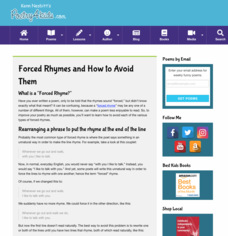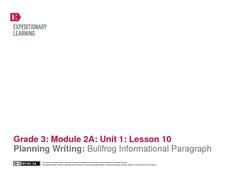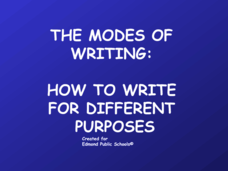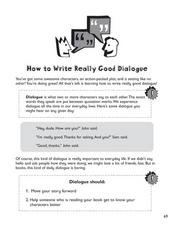EngageNY
How to Write Like a Scientist in the Field: Introduction to the Elements of Field Journals
It's time to start journaling. Scholars look at examples of science field journals. They work in pairs to examine and complete a note catcher about a field journal. They then add to an anchor chart by discussing the different features...
Curated OER
Like Water for Chocolate: How-to Narrative Essay
Connect Laura Esquivel's Like Water for Chocolate to student experience with this how-to narrative essay. Writers weave the instructions from their own family recipe into a narrative using sensory details. This assignment sheet includes...
Illustrative Mathematics
Writing Constraints
Use this resource to present your number crunchers with how to write a constraint equation and to determine viable solutions. The price of an object limits the amount that can be purchased. The speed at which you walk limits the number...
Curated OER
How to Write a Bibliography
Have your class learn to write a bibliography. First they are introduced to bibliographies and their purpose. Then, they examine what information must be included in their bibliography. In the end, they write a bibliography of their own.
Curated OER
How To Do an AHAP DBQ
How is an essay like a hamburger? Detailing the "meaty" parts of a well-written essay, this presentation takes students through the process of using a strong thesis statement to write a thorough and engaging response to a Document Based...
Curated OER
Borrowing Narrative Skills from Mr. Fletcher: Using a "Prompts in Reverse" Technique to Inspire Your Writers
Help your class find their writing voices with this lesson which uses the work of Ralph Fletcher to guide a "Prompt in Reverse" activity. Using the chapter "First Pen" from Fletcher's Marshfield Dreams, learners decipher what they...
Teachers.net
How to Write a Movie Review from a Pet's Perspective
When would two paws up denote a blockbuster film in your classroom? Only when young writers create movie reviews from a pet's perspective in this imaginative expository writing practice. This engaging topic begins with a class discussion...
Poetry4kids
Forced Rhymes and How to Avoid Them
Ready to take your poetry writing to the next level? Use an independent lesson to iron out all those forced rhymes, wrenched rhymes, and near rhymes from first-draft poems.
Bermingham City Schools
Opinion Writing
It's no secret that children can be very opinionated, but rather than fight against this natural tendency, embrace it with this primary grade writing project. After a shared reading of a children's book about persuasion, young learners...
Poetry4kids
How to Create Book Spine Poetry
Can you create a poem without writing a word! With found poetry, you can! Practice one version of found poetry with a lesson on book spine poems. Learners create poems by stacking books and reading the lines created by their spine titles.
Poetry4kids
How to Host an Open Mic Poetry Party
Four steps to Open Mic Night! The location, invitations, supplies, and party favors are all part of the process in planning and hosting a fun-filled gathering where scholars read aloud an original poem or one by their favorite author.
EngageNY
Reading and Writing About How to Perform a Process: How Meg Lowman Studies the Rainforest (Pages 4–8)
It's a process. Scholars read to understand the process Meg Lowman uses for pressing specimens. Learners work in groups to define vocabulary and create a list of the steps used. They then carry out the steps using provided materials.
EngageNY
Planning Writing: Bullfrog Information Paragraph
Lesson ten in this unit for the book Bullfrogs at Magnolia Circle, prepares third graders to begin writing an informational paragraph about the adaptations of bullfrogs. First, young writers work either independently or in pairs to...
Edmond Public Schools
The Modes of Writing: How to Write for Different Purposes
Do your pupils know the difference between varying types of writing? This 57-slide presentation is made up of four sections: narrative writing, descriptive writing, expository writing, and persuasive writing. Split it up and use the...
The New York Times
Writing to Explain: Creating How-To Scripts and Demonstrations
Excuse me, can you give me directions? Scholars examine and practice technical writing to increase their ability to write directions. They participate in discussion, watch videos, and complete an assignment to create their own directions.
Curated OER
How to Write Really Good Dialogue
How do you create (and punctuate) really good dialogue so that it moves your story forward and provides strong characterization? Use this literary worksheet loaded with examples, clearly stated directions, and fun exercises. Fifth in a...
NWT Literacy Council
How to Kit: Readers Theatre
Immerse your class in a good story with an extensive resource featuring reader's theater techniques. The worksheets are designed for both teacher and student, and carefully explain how to organize, write, and perform stories in a...
Curated OER
Writing Short Stories: The Fun Way
Do your young authors suffer from writer's block when they try to write short stories? Access their natural creativity with C-Gor, the writing monster! The instructional activity takes aspiring authors through a new writing process...
Curated OER
How To Use the Six Traits of Writing
Use these reference tools to plan and organize the Six Traits of Writing Program.
Curated OER
How To Calm Back-to-School Nerves
Set students up for success with these tips for getting the year off to a smooth start.
Curated OER
Eight Ways to Learn All About Me
Activities designed to encourage young ones to learn who they are and how to express themselves.
Curated OER
How to Write an Essay: Secondary ed.
Whether introducing the structure of expository essays or reviewing the format with your high schoolers, take the time to check out this resource. Examples of seven common forms of introductory paragraphs and six types of conclusions, as...
Curated OER
English Grammar Help, How to Write Correct Sentences
Here is a neat way to promote independence in your learners with dyslexia. Learners can access this resource for quick tips in writing complete, grammatically correct sentences. It's like a cheat sheet kids can use on their own. To...
Curated OER
Writing Effective Thesis Statements and Introductory Paragraphs for Research Papers
After reading on the topic of their paper, high schoolers work in pairs to assess how to write powerful, precise thesis statements. The introduction contains three statements: a universal statement, a bridge statement, and a thesis...
Other popular searches
- Persuasive Writing How To
- Writing a How to Essay
- Speech Writing How To
- Research Writing How To
- Writing How To
- Writing a How to Essay
- How to Writing Prompts
- Writing a How To
- Writing a How To
- Writing How to Paragraphs
- Explaining How to Writing
- Writing How To

























